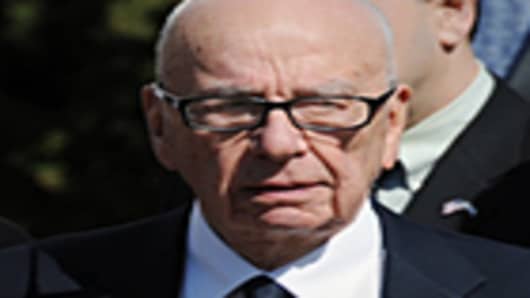Rupert Murdoch, the billionaire media tycoon, admitted that there had been a “cover-up” at defunct tabloid News of the World over phone hacking in London, but maintained on Thursday that neither he nor his son James knew about the extent of hacking.
Speaking to the Leveson Inquiry, Murdoch aimed blame at a number of subordinates for the cover-up, and made disparaging comments about several former News International editors who have criticized him.
There was more tension in the air than during Wednesday’s questioning, which many felt was rather a damp squib after the drama of Tuesday’s revelations about the closeness of the current UK government to the Murdochs.
Murdoch told the inquiry into media ethics: “There is no question in my mind that maybe even the editor, but certainly beyond that, someone took charge of a cover-up which we were victim to and I regret.”
With wife Wendi and son Lachlan watching he said that he, his son James and other senior News Corp executives were “misinformed and shielded” about the extent of phone hacking at the tabloid. He also blamed “a clever lawyer” at News International for stopping people coming forward and admitted that the culture had left too much in the hands of the editor and lawyer.
“I should have gone there and thrown all the lawyers out of the place and seen Mr Goodman (the reporter jailed over phone hacking) one-on-one - he had been an employee for a long time - and cross-examined him myself and made up my mind, maybe rightly, maybe wrongly, was he telling the truth,” Murdoch told the court.
"And if I had come to the conclusion that he was telling the truth, I would have torn the place apart and we wouldn't be here today."
Tom Crone, News International's veteran legal manager, issued a stinging attack in response.
"Rupert's evidence today about a lawyer...can only refer to me. His assertion that I "took charge of a cover-up" in relation to phone-hacking is a shameful lie," Crone said in a statement.
"The same applies to his assertions that I misinformed senior executives about what was going on and that I forbade people from reporting to Rebekah Brooks or to James Murdoch."
Lord Leveson, the judge leading the inquiry, described Murdoch’s approach to allegations of blackmail by News of the World reporters as “disturbing.”
'Myths' Dismissed
The allegations stem from an incident involving former Formula 1 boss Max Mosley, who was photographed in an orgy. Two of the women involved were said to have been offered to have their faces pixelated out of pictures in return for giving more details about the sado-masochistic party.
“It is a common thing in life, way beyond journalism, for people to say, 'I will scratch your back if you scratch my back’,” Murdoch said.
Colin Myler, the former editor of the News of the World, and Tom Crone, its former head of legal affairs, have both contradicted James Murdoch’s testimony about when he was told that phone hacking went beyond one rogue reporter.
Passages from the memoirs of ex-Murdoch editors Andrew Neil, now a BBC presenter, and Harold Evans, former editor of The Times and The Sunday Times, about Murdoch's sway over editors were dismissed as “myths” or contradicted.
Murdoch also admitted that the scandal cost him the deal to fully take over UK paid-for television provider BSkyB . He complained about being harassed by paparazzi following the phone hacking scandal but conceded it was part of “the game.”
Meeting politicians to put News Corp’s views across was also deemed part of “the game” of media ownership in his testimony Wednesday.
He added that he “did not see anything wrong” with News Corp lobbyist Frederic Michel’s frequent communications with Culture Secretary Jeremy Hunt’s special advisor Adam Smith. Emails between the two raised eyebrows on Tuesday as to the extent to which Smith was briefing Michel about the government’s attitude towards the BSkyB bid.
He admitted he was “surprised that it had gone on for so long and that there were so many emails.”
Rupert Murdoch also took the opportunity to air his views on the future of the media. He believes that the print media is likely to be only available in tablet form within the next two decades, and said there would be “billions” of tablets in the world within the next decade.
News International has invested heavily in iPad applications for The Times and The Sunday Times, in an attempt to hold on to its readership as circulations decline.




